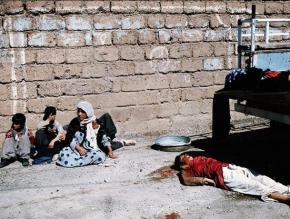When the humanitarian mask slipped
points out the hypocrisy in Western calls for intervention in Syria.
THE OLD Firm is on its way back and spoiling for a fight. The UK and France, the colonial powers which carved out the unnatural borders of the Middle East following the collapse of the Ottoman Empire, appear to believe they have unfinished business in the region, putting manners on recalcitrant Arab regimes. The U.S. is all set to weigh in.
The fact that military intervention is predictably likely to make matters worse rather than better won't stay their hands. The hypocrisy and double standards will blithely be ignored.
The clearest example of inconsistency concerns the kidnap, rendition and torture of Syrian-born Canadian citizen Maher Arar. He was detained on September 26, 2002, at JFK International Airport in New York City as he travelled home with his family from a holiday in Tunisia. His subsequent ordeal is by far the most investigated story of rendition. He won an apology and damages of more than $10 million from the Canadian government.
From the U.S., no apology and not a cent.
At the terminal building at New York, where he was awaiting a connecting flight, Arar was taken aside for questioning. It was later shown that Canadian security authorities had passed inaccurate "intelligence" on him to their U.S. equivalents. He was searched and fingerprinted, then moved to a different location and questioned for two days about his associates, his political views and whether he had ever met Osama bin Laden. He denied everything.

Arar was then handcuffed and, with his legs shackled, taken to a maximum-security prison where he was strip-searched, threatened with deportation to Syria and, again, interrogated about militant Islamic groups. After two weeks, he was put back into handcuffs and shackles, dragged aboard a private plane, flown to Jordan and handed over to Syrian security police.
He says he was driven across the border and held for 10 months in a dank cell no more than 6-feet-by-3-feet, and repeatedly beaten with frayed electrical cables, kicked, punched and threatened with electric shocks if he didn't own up and provide information. He says he lied that he had been to a training camp in Afghanistan. He says the nature of the questions suggested that they had been supplied to Assad's interrogators by a U.S. or Canadian agency.
Arar was released on October 5, 2003, after 374 days in the clutches of the Assad regime. He returned to his job as an engineer in Ottawa. His wife, Monica, a professor at Ottawa University, had waged a non-stop campaign for his release and now led calls for an inquiry. After a formal investigation by the Commission of Inquiry into the Actions of Canadian Officials in Relation to Maher Arar, the Canadian government accepted his innocence, admitted its role and paid compensation.
The point is: The U.S. outsourced the torture of Arar to a regime which is now denounced by Obama as a foul dictatorship with no legitimacy and with which no civilized country should associate.
THEN THERE'S the question of Halabja, a Kurdish town in Iraq on which the government of Saddam Hussein dropped a huge quantity of poison gas during the Iraq-Iran war. Halabja, population 60,000, had been captured on March 15, 1988, by the Patriotic Union of Kurdistan, at that time in alliance with Iran. Saddam's response was swift and merciless.
At dawn the following morning, Iraqi bombers sharked across the sky, dropping chemical bombs from Migs, supplied by Russia, and Mirages, supplied by France. The town was smothered in a fog of death.
The first journalists to arrive were Iranian. The pictures which shocked the world--dreadfully, dispiritingly similar to the recent images from Damascus--were by photojournalist Kaveh Golestan, later killed covering the U.S. invasion of Iraq for the BBC.
An Iranian reporter described the scene: "The streets were strewn with corpses. People were killed instantaneously in the midst of the ordinary acts of everyday life. Babies still sucked their mothers' breasts...In the space of a few hours, 5,000 people had died."
Months later, a resolution calling for sanctions was passed by both houses of Congress--and then vetoed by Ronald Reagan. The U.S. government then authorized a $1 billion loan to Saddam.
In August 1988, the UN subcommittee on human rights rejected by an 11-to-8 vote a resolution condemning the Saddam dictatorship. Of Western-orientated powers, only the Scandinavian countries, Canada and Australia supported the move.
Iraq was seen at the time as a secular bulwark against Islamic Iran. It was later established by the Scott Inquiry that the Tory Government had secretly encouraged the Matrix Churchill company to break UN sanctions to re-supply Saddam's army.
It was the invasion of oil-rich Kuwait in 1989, not Saddam's gassing of 5,000 of his own people, which prompted the West to invade Iraq in 1991.
They had trusted the Syrian regime to torture on their behalf and stood by while Saddam gassed five times as many civilians as is now alleged against Assad. What reason could there be for trusting them now?
First published in the Belfast Telegraph.


